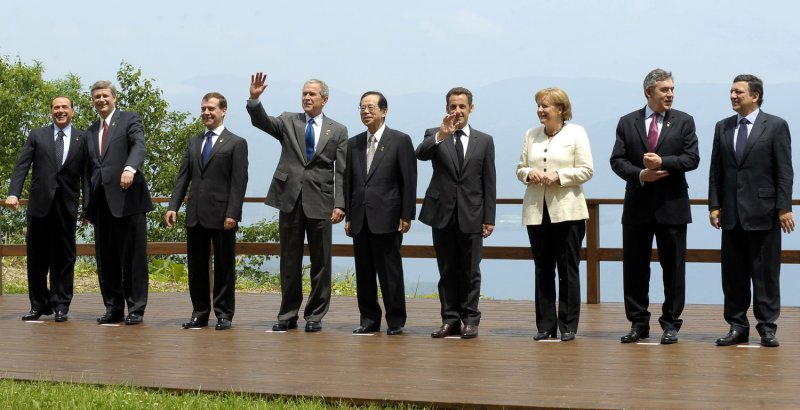1 of 8 | G8 leaders pose for the official Summit photograph at the Windsor Hotel Toya Resort and Spa in Toyako, Japan on July 8, 2008. The leaders include, from left to right, Italian Prime Minister Silvio Berlusconi, Canadian Prime Minister Stephen Harper, Russian President Dmitry Medvedev, U.S. President George W. Bush, Prime Minister of Japan Yasuo Fukuda, French President Nicolas Sarkozy, German Chancellor Angela Merkel, British Prime Minister Gordon Brown, and President of European Commission Jose Manuel Barroso. (UPI Photo/Alex Volgin) |
License Photo
WASHINGTON, Nov. 14 (UPI) -- The G20 summit is unlikely to establish a secure global financial structure for generations, like Bretton Woods did in 1944, but it's an epochal meeting just the same.
As the British Broadcasting Corp. noted, the Group of 20 major industrialized nations assembling in Washington will gather the leaders of 85 percent of the world's economy and two-thirds of its population to try to solve the current global financial crisis.
The fact that the G20 are meeting rather than the usual Group of Seven -- or Eight, when Russia attends -- major industrialized nations is itself potentially a historic sea change in global affairs. It will bring major nations like China, Brazil, India, Argentina, South Korea, Mexico and South Africa into the core deliberations of the world, along with the "usual suspects" of the United States, Canada, Japan, Italy, Germany, France and Britain.
The G20 will actually meet with a sense of optimism in the air. The Dow Jones Industrial Average yo-yoed throughout the day Thursday with a 900-point swing from low to high. Although it dipped below 8,000 briefly, it then headed steadily upward after U.S. President George W. Bush's speech extolling the virtues of capitalism, to close 6 percent up on the day.
Whether this was Bush's plea to spare capitalism or 8,000 was a trigger point for investors to start buying assets they thought undervalued is hard to tell. But it was a first in recent weeks. Previous pep talks by Bush and his Treasury Secretary Henry "Hank" Paulson during the current crisis have always sent the market down.
Nevertheless, the widely touted idea that the G20 summit will be a Bretton Woods II appears to be a pipe dream. The Bretton Woods conference mapped out an ambitious global economic structure to be guided by two new institutions -- the International Monetary Fund and the World Bank -- and to be led by the United States, whose global industrial and financial primacy was then unprecedented and unchallengeable.
However, today economic power is diffused around a high-tech, globalized marketplace. The G20 leaders will not have the opportunity to leisurely plan ambitious and stately new global financial institutions that they can raise up from scratch at the end of a global war. They are scrambling madly to try to reverse global economic forces that they so far have shown no ability to control.
Also, a group of 20 national governments is an exceptionally unwieldy body to agree upon and then implement decisive, focused, clearly defined economic policies.
British Prime Minister Gordon Brown, whose experience as a finance minister is unrivaled among the G20 leaders, has urged the gathering to focus on cutting taxes and boosting their combined spending. It is doubtful whether this neo-Keynesian approach by itself can work. It could unleash unparalleled global inflation and loss of confidence in major currencies. But at least Brown restricted himself to broad policy guidelines. Anything more detailed was bound to be rejected or subjected to hairsplitting and haggling by many of the governments attending.
It is ironic that Brown and French President Nicolas Sarkozy have emerged as global leaders in proposing initiatives to deal with the crisis because the expansion of the summit to the G20 confirms the reality that economic power in the 21st century is spreading beyond and away from its previous centers of North America, Western Europe and Japan. This previously has been assumed to be a Good Thing, and it certainly should be for the other regions of the world involved, but it remains to be seen if the United States, Britain, France, Germany and Japan ultimately will benefit from the process.
At its worst, the G20 could fizzle out as just another prestigious kaffeeklatsch with much talking, a lot of picture-taking and little resolution, especially considering the lame-duck status of host U.S. President George W. Bush.
Bush set the agenda for the summit Thursday, saying common accounting standards, oversight of some financial products such as credit default swaps, coordination of market regulations and additional say in the IMF and the World Bank for emerging markets would be among the topics covered.
Also apparently gaining traction is the "college of supervisors" idea, which first surfaced last spring, to oversee international banking regulation.
It is clear that the summit will have to deliver more than just vacuous expressions of optimism and encouragement. For the global economic crisis is continuing to spread and grow in seriousness. In the United States, city governments are joining the banks, insurance companies and carmakers in asking for federal help.
Atlanta, Philadelphia and Phoenix have made requests and Chicago is warning of layoffs, while Detroit has the threat of the collapse of General Motors and major problems afflicting Chrysler and Ford exasperating its woes.
The G20 is certainly likely to mark the emergence of China as a global player on par with the United States, Japan and the entire European Union. China has already committed 7 percent of its GDP over each of the next two years to infrastructure projects and encouraging domestic spending. If Beijing can maintain a high level of growth, it will become a major -- and possibly even the leading -- driver of the global economy. The U.S. bailout plans to date the amount to 2 percent to 3 percent of U.S. gross domestic product.
The task facing the G20 leaders is Herculean, but every sane person watching their deliberations prays they can succeed.















